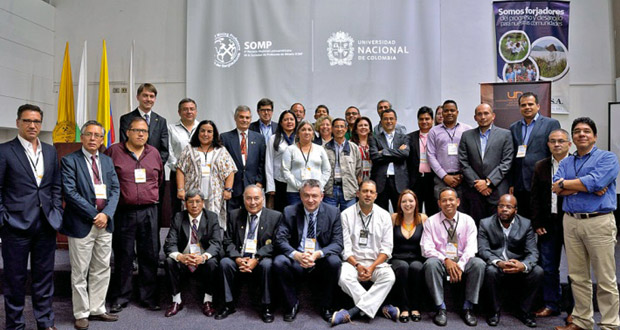Accounting for 18 % of electricity production, coal is one of the most important sources of energy in Germany. The lion’s share of the coal used comes from abroad, with around 16 % from Colombia. This makes the South American country the third largest supplier after Russia and the USA. As a result of ecological crimes and the violation of human rights, however, the Colombian coal industry is currently in crisis. With this in mind, the Georg Agricola Technical University (THGA), Bochum/Germany, is working on ways to ensure greater sustainability. President of the THGA, Prof. Dr. Jürgen Kretschmann, and economist Prof. Dr. Alfred Niski travelled to Colombia to meet colleagues, students and industry representatives.
Since November 2015, the THGA has been a partner university of the Universidad National de Colombia (National University of Colombia – UNAL). The delegates met at its mining faculty in Medillín. There, Kretschmann and Niski told students about the higher education system in Germany and presented opportunities for studying at the THGA. The regional conference of the Society of Mining Professors (SOMP), which also took place in Medillín (Figure 1), also had the objective of intensifying scientific exchange. The most important meeting of raw materials scientists in the world brought together almost every mining university in Latin America for the first time. Representatives from Spain and the two delegates from Bochum were the only European participants.
During the subsequent national congress of the Colombian mining industry, attendees put questions to the two THGA professors as experts in sustainability. While Kretschmann’s presentation focussed on occupational and environmental protection as well as risk management in coal production, Niski discussed opportunities for sustainable conflict management. “The Colombian coal industry is controlled by international corporations that are not concerned with the rights of the local population. Some conflicts are dealt with at gunpoint, property rights and the traditions of indigenous peoples are completely ignored. A sustainable solution can only be found by entering into fair dialogue with all involved, with special consideration for the weakest members of society,” says Niski.
“We must act as ambassadors for the sustainable extraction of raw materials in South America,” adds THGA President Kretschmann. “Human rights, environmental protection and occupational safety standards, as drawn up by the International Labour Organisation (ILO) must also apply to the Colombian coal industry. Economics Minister for North Rhine-Westphalia Garrelt Duin and Chairman of the Board of IG BCE Michael Vassiliadis have already said the same thing. Our domestic power must not be supplied at the expense of people and the environment elsewhere. For this reason, we are keen to support our colleagues at the UNAL and further intensify the exchange of knowledge.” (THGA/Si)
